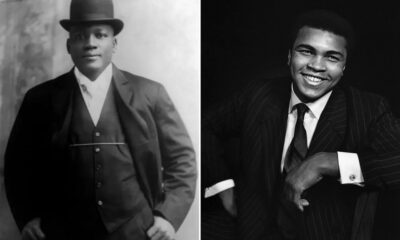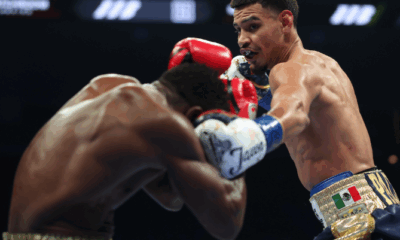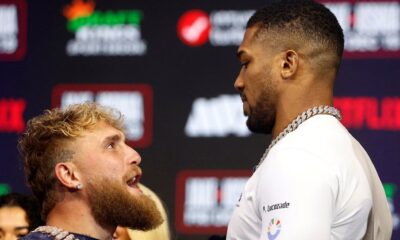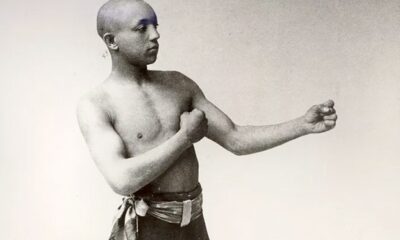Featured Articles
In Defense of The Sweet Science
The subject of the abolition of boxing pops up periodically. No surprise, most of the time, the drums are beaten for the banishment of the sport after a fighter pays the ultimate price for their participation, their life.
On November 30, a sportswriter for the New York Daily News weighed in with a call to bury the manly art of self defense, putting forth that because we the people now know better, we should do better. His definition of “better” includes a world in which there is no structured setting for a person to test another person in hand-to-hand combat. My reaction to this effort by Filip Bondy? I offer that his thesis was flimsy, his reasoning largely thin and/or flawed, and while I will assume his intentions are good, that he is a fine fellow who means no harm, his editorial betrayed a considerable dosage of ignorance and patronization.
“Boxing has seen its time, and thank goodness that primitive era is done,” the writer put forth in a essay which ran in a Saturday edition of the News.Where to begin? Well, if this “primitive era” is over, I must have missed the memo. Last I checked, man’s inhumanity to man is still in evidence on an hourly basis, and if you permit me a diversion from the world of sport to the wider world, let’s talk about wars. The writer despises the presence of a sport he deems “repulsively gladitorial,” and it made me wonder what he thinks of, say, the war the United States has been partaking in the Middle East and thereabouts. The writers’ thesis and word choice left me pondering what he might think of his newspapers’ description, on Friday, Dec. 16, 2011 of our participation in the Iraq War. “Despite false starts, failed opportunities and fatefully bad decisions, history will deem the war in Iraq a success,” it was stated in a Daily News op-ed.
Now, I don’t mean to be flippant, but I dare say the families of the near 5,000 Americans killed might not see the war as being so cut and dry. And was there something forbidding the News from mentioning the statistic which pegs the number of Iraqi civilians dead as a result of the US invasion as 1.4 million plus?
Success, huh? Want to reconsider that confident assertion, Daily News? Care to widen the scope of your “boxing should be abolished” op-ed, Mr. Bondy? Care to talk some more about this so-called “enlightened age” we live in, sir?
Now, some might say, hey Mike, Bondy is a sportwriter, we can’t expect him to traffic outside that narrow band. OK, gotcha. Let’s stick to sports. Another thing Bondy didn’t touch in his call to abolish is the mental and emotional makeup, the fierce and at-times all consuming desire of some humans to push themselves to the enth degree. I wouldn’t expect Mr. Bondy to be able to channel that urge; I don’t possess that, and evidently neither does he, as someone who sits on the sidelines and weighs in on the activities of bolder souls. But I’ve spoken to enough fighters–and that’s what they are, fighters, that is their identity, that is their calling, that is their reason for being–to know that these men and women need to test themselves in the ring. They need to prove to themselves and/or the world at large, what they are capable of doing, of being. They need a task, a goal that is larger than what Mr. Bondy and I need to make the time pass. And so, if we ban boxing, we must know without a single shadow of a mitigating doubt that they will seek avenues where they can explore this all-encompassing desire to compete with another being and themselves to such an extreme level.
They will do it in warehouses, dank places surrounded not by physicians and an ambulance at the ready, but by shady entrepeneurs whose structural support platforms consist of nothing beyond a stack of hundred dollar bills to the victor, and an ability to submerge any hint of conscience and decency which our athletic commissions evince on a daily basis.
Now, I’ve read Mr. Bondy, and sometimes enjoyed his work in the past. Most if not all of that material has touched on the sport of tennis. A fine sport, no doubt, one I’ve participated in myself. I enjoy a few sets each summer, in fact, and derive enjoyment from the act. But, let’s be clear, if we are to compare and contrast the thrill, and the deep-set satisfaction one can derive from attaining victory in a “mere” tennis match, as opposed to the satisfaction attained by a prizefighter who has left teaspoons (sometimes tablespoons!) of their blood and sweat on the mat and climbed off the canvas to score a knockout victory and win the heavyweight championship of the world…well, apologies to all the Federers out there, but I think the fighter has a hand up on the racquet man.
It didn’t surprise me that a Bondy took the opportunity to write that simplistic column, so slanted and lacking nuance, as it was printed in the wake of the Magomed Abdusalamov tragedy, which saw the Russian heavyweight suffer brain damage during his Nov. 2 bout against Mike Perez at the Madison Square Garden Theater in NYC.
“Once again this month, we were witness to another boxing atrocity in the city,” Mr. Bondy wrote. The between the lines message could be construed as: once again, and this happens ALL the time, the savage sport left another poor soul rendered fallen, because of the haplessness of overseers. And anyone interpreting Bondy’s messaging in that fashion would be, at best, left with an incomplete conception of that event, and at worst, a fallacious takeaway. I take slight issue with the inclusion of the word “atrocity.” Here’s what I think Bondy did; cursorily examined the Magomed bout, and went to town. He didn’t study the film, see that Mago was still looking to land a KO in the waning seconds of the bout. He evidently didn’t know or wasn’t swayed by the fact that a renowned neurologist spent time with Mago post-bout, assesssing him. No, Bondy wanted to play the self-righteous preacher role, and bemoan the “atrocity,” and prove his bonafides by going all in, and calling for abolition, rather than an examination of practices and protocol that perhaps could be clarified or tweaked to better serve the health and well being of the fighters. You could, I suppose, forgive the man for engaging in unsubtle lobbying suited for the platform he works off of, the tabloid. I won’t, but you could.
And let’s be clear here: Magomed Abdusalamov entered this bout, and this sport, with his eyes wide open. He is and was a fighter to the core, one not prone to quitting, not built like most of us folks to wave a white flag when the going gets tough. He knew what that price could be for his participation, they all do. Do they ponder that potentiality excessively? No, it wouldn’t be prudent, it would in fact be crippling. But ample information, from a hundred years of data collection, is available to any and all pugilist who considers entering the ring and testing their will and skill. And Magomed, being a man operating with free will, engaged in the one life he knew to be available to him, choosing to practice a combat sport which satisfied, I presume, his soul, and offer him a path to improved economic status.
About that “improved economic status.”
I have no way of knowing Mr. Bondy’s net worth, his level of economic comfort, or lack thereof. But I’m hopeful, if not overly optimistic, given the limited scope of his piece, that he understands that in these times, many if not the majority of young adults are at the very least occasionally dubious of their prospects to reach a higher economic level than their parents did. Wage growth has been flat for the masses for 40 years, 50% of us who rent now pay a third or more of our income to the landlord, as opposed to 38% ten years ago, and the costs of higher education have soared more than 500% since 1985 (as opposed to “only” about 200% for gasoline).
For a Caucasian like me, who came from a home where attending college was a given, the path to reasonable prosperity is not so vague. I know I’m fortunate. Does Mr. Bondy comprehend that if he gets his way, and the sport is abolished, that one path to prosperity will be removed for people who don’t enjoy multiple options to a place of prosperity? Perhaps Mr. Bondy isn’t aware that a US citizens’ prospects to jump upward in social class is the third lowest among developed nations. I don’t think it’s a stretch to say that in the coming decades, we might well see even more skilled boxers being produced in the US, if Mr. Bondy doesn’t get his way, as one in five American children now live in poverty. Most of us understand that from the most meager existences, some of the most majestic athletes are borne, as it is impossible to manufacture in an atmosphere of abundance the reservoir of determination that grows in some of the superlative souls who beat the grim odds and lift themselves out of dire straits. Now, when the world gets its head screwed on straight, and we better address issues of wealth disparity, and the Rand acolytes are removed from positions of power, then, Mr. Bondy, you and me can revisit the topic. But until then, I’d appreciate you not so blithely lobby for the removal of one road to prosperity for those of meager means.
I take issue with Mr. Bondy’s lobbying, ostensibly, I guess, on behalf of the fighters who he reduces to being “just poor, desperate minorities getting their heads ripped apart internally, synapse by synapse.” I have yet to meet the man who campaigned in the battleground of the sweet science, achieved a level of acclaim and monetary reward, and looks back with nothing but regret, wishing the Bondys of the world had succeeded in deciding for them their life path. Hey, maybe we can revisit Bondy’s concern for the “poor, desperate minorities” when more paths to prosperity are fashioned in a more equitable fashion. And perhaps I will have less scorn for the Bondy piece when he acknowledges the damage done by alcohol, which does a more complete job in ripping heads and lives apart, and skewing synpapses than boxing could ever hope to achieve if there were ten times the number of events held annually.
Mr. Bondy notes that people are more aware of the costs of ring battle, and that the concussion debate and examination is touching other sports. He says its “absurd” to sanction a sport in which the aim is to knock out the foe. There, I’ve found some common ground with Mr. Bondy; I have occasionally come to the same conclusion. It can look absurd. As can the sport of football, which features two men running at 20 MPH and then butting heads like rams. As can the sport of auto racing, which features a person hurtling themselves around a course at 180 MPH, wrapped in a vehicular grenade, and seeking to avoid hitting a wall which could disintegrate their body.
I can go on…and I would end up, forgive me, in the same place. That is a place of dismissiveness of Bondy’s call: if we’re speaking out against sanctioning dangerous practices, shouldn’t we all band together and exit the realm of sports, which offers endless hours of diversion and enjoyment in a world which always has been and will be in need of both, because of the brutish nature of existence for all us masses of men who lead lives of quiet desperation…and instead transition to the real world, and the unending thirst for warfare?
I could go on and on..and I will, actually, since there is something to take offense at in every paragraph of the Bondy piece. What about when the Daily Newser writes, “Whenever a boxer gives up, like Sonny Liston or Roberto Duran, he is mercilessly mocked for the rest of his career.” That is such a simplistic and buffoonish reduction and is so nakedly idiotic as to discourage examination, for the assertion is so facile. To say or imply that the life of Liston or Duran can be boiled down to nothing more than their being an object of ridicule is remarkably ignorant. Let’s backtrack, shall we, to their upbringing. Liston and Duran had in common that their youth was spent in circumstances that would have demolished the soul of most who had to firewalk through it.
Liston was the 24th of 25 kids, and a growling belly was too frequently the norm for him growing up in Arkansas and St. Louis. Shoes were a luxury. Duran fended for himself in a Panama slum and was selling newspapers at age seven. Dad bolted, mom was overwhelmed, so he’d often forage in garbage cans for meals. And both men persevered. And found a sport which would put up with their idiosyncracies of temperament, and instead of leaving behind a wake of carnage and lives–their own, maybe others–lost, and are enshrined in Halls of Fame which boast of their will and skill and accomplishments, which is more than will be said or Mr. Bondy and me, I dare say. Bondy, it seems, hasn’t paused to consider that without boxing, which he hopes will soon be banished, the malevolence of those Durans and Listons would have been directed at any number of innocents.
Every day, at least one kid walks off a street of a slum, in America, and the world over, and comes under the spell of the ring and, hopefully, one or two role models who see themselves in that little boy lost. And a boy adrift and headed for the shoals of sorrow is re-directed, and reborn, in a milieu by no means perfect, but one that affords him, even despite the blows that will rain down on him, a more respectable and fruitful arc of life than he would have been inflicted with otherwise.
Great God, Mr. Bondy, none of us maintain the sport is perfect, and all involved should always be examining ways to make it better, and keep the participants as safe as humanly possible; but sir, there are by no means infinite options for self-improvement for young people whose higher education comes not from classrooms inside Ivy-covered walls, but from negative role models who succumb to the false hope of easy money and self-destructive thrill-seeking…Do you really want to abolish this proven path to a better place, Mr. Bondy? What say you stick to the racquet game, and let the people who have a better grasp of all sides of this sweet and savage science do the analysis of the sports’ strengths and weaknesses.
-

 Featured Articles1 week ago
Featured Articles1 week agoSebastian Fundora: The Towering Inferno’s Ascent in the Sweet Science
-

 Featured Articles6 days ago
Featured Articles6 days agoAnthony Joshua Discharged from Hospital After Fatal Nigeria Car Crash — Latest Updates
-

 Featured Articles2 weeks ago
Featured Articles2 weeks agoDecember 26: This Day in Boxing History — Jack Johnson, Muhammad Ali, and Global Heavyweight Legacy
-

 Featured Articles3 weeks ago
Featured Articles3 weeks agoDiego Pacheco, Joe Cordina, Tito Mercado, and Skye Nicolson Triumph in Stockton
-

 Featured Articles4 weeks ago
Featured Articles4 weeks agoMurat Gassiev KOs Kubrat Pulev in Dubai
-

 Featured Articles3 weeks ago
Featured Articles3 weeks agoI’m Betting on Jake Paul … To Live*
-

 Featured Articles3 weeks ago
Featured Articles3 weeks agoThe Sweet Science Weekly— December 15, 2025
-

 Featured Articles1 week ago
Featured Articles1 week agoDecember 28: This Day in Boxing History: The Enduring Legacy of George Dixon














